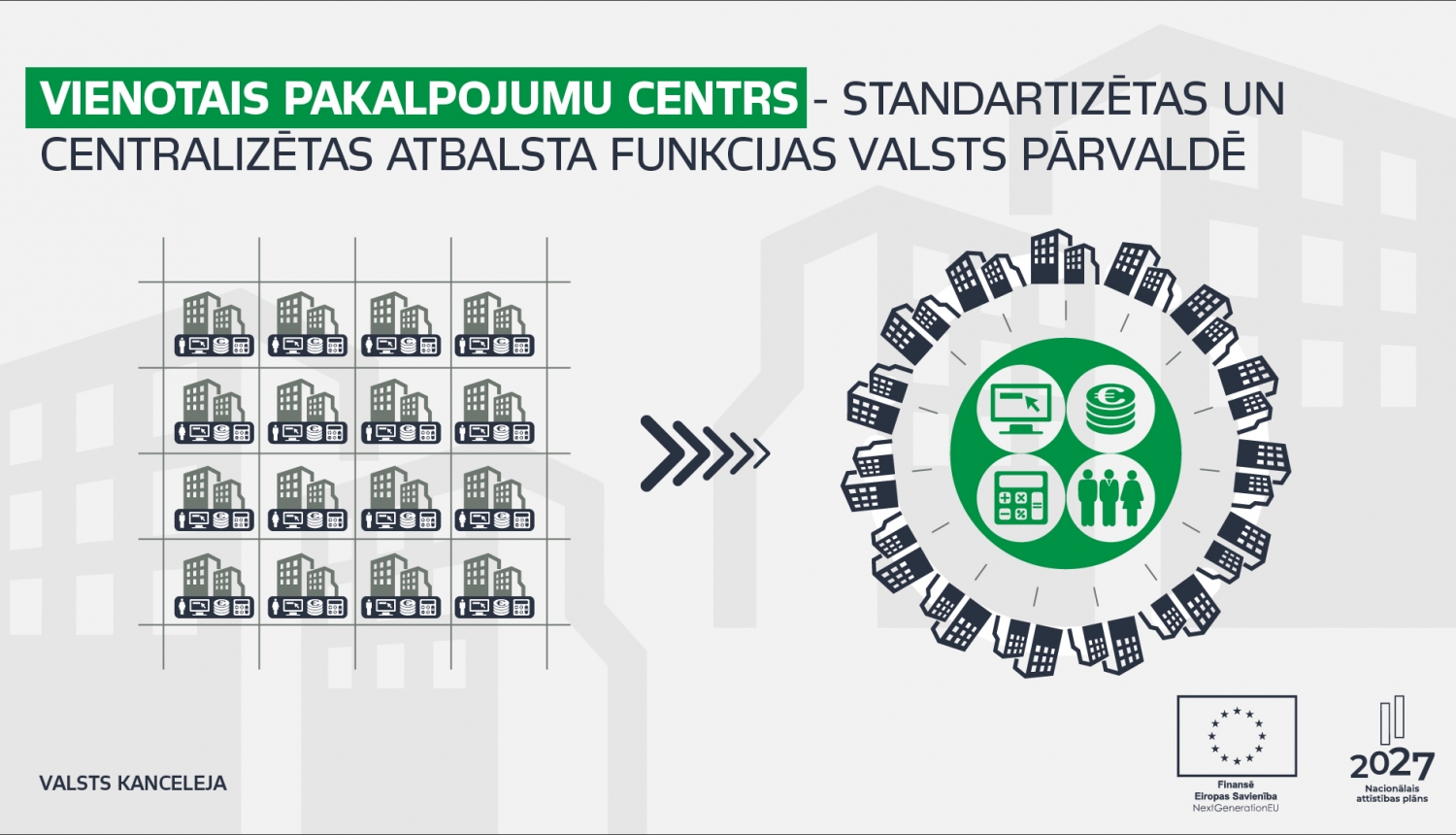On 27 June, the Cabinet of Ministers conceptually supported the centralisation of several support functions in public administration. The establishment of a Single Service Centre will allow the public administration to concentrate the financial and human resource management functions in a single place in the coming years, and thereby release resources to be used by institutions for their principal functions in the future.
The Conceptual Report produced by the State Chancellery and the Treasury marks a gradual transition to centralised financial accounting, budget planning and financial management, as well as the organisation of training and human resource development processes in public administration institutions. The transition to unified IT systems, standardisation of work processes, automation of simple operations will lead to the creation of the Single Service Centre that will provide the public administration institutions with support functions, thus reducing the resources they use for support functions.
Director of the State Chancellery Jānis Citskovskis: “The readiness of the public administration of Latvia to transform and share common processes and technological opportunities is a positive signal for modernising our work. We must allow technologies to exercise simple functions to ensure that the public administration employees can invest more in addressing society’s needs.”
The establishment of the Single Service Centre is an essential part of the Public Administration Modernisation Plan. It was initially planned that the centralisation of support functions will take place by 2030, the government, however, urged to set a more ambitious target leading to the approval of faster joining of departments to the Single Service Centre.
The Single Service Centre is expected to serve 80 % of the public administration employees by the end of 2026. Centralised use of support functions by public administration institutions would result in a reduction of around 40 % of staff. The standardisation of processes and the establishment of the Single Service Centre will require investment. In addition to the Conceptual Report, the Cabinet of Ministers also approved the allocation of EUR 16.8 million from the Recovery Fund. Additional EUR 13.15 million will however be needed from the state budget.
During the establishment of the Single Service Centre, the personnel management-related centralisation and standardisation processes will be under the auspices of the State Chancellery and the School of Public Administration, while financial and accounting processes – the Treasury’s responsibility.
At present, the public administration institutions themselves implement the support functions in differing ways, using different information systems and software. Consequently, each institution requires staff to ensure both the support functions and the support of IT systems. In addition, the opportunities to automate manual operations are underused. Such fragmentation also makes it difficult to collect and analyse data in the country as a whole.
Thus, for example, most institutions use MS Excel in their financial and accounting processes and consume large resources to produce financial data and make manual copies between systems. This hinders both the financial management of the institutions themselves and the state budget planning. By standardising these processes and automating administrative activities, it will be possible to ensure higher quality financial data and to significantly reduce burden and funding. The implementation of a single solution in financial accounting for the Single Service Centre will fall within the scope of competence of the Treasury, by developing the Horizon system that is widely used in the public administration.
In addition, standardized financial accounting processes and a tailored system to be used by all institutions would ensure facilitated accounting and easy access to information required for financial management. It will also be possible to analyse the situation in public administration as a whole using reliable data, for example, in the field of remuneration. The human resource development, the organisation of training and development is the second area where the Single Service Centre will provide support functions for the public administration. The data currently available on human resources in public administration are very limited, fragmented and duplicated in different information systems. This makes it difficult to develop a common understanding of the human resource development in public administration.
The State Chancellery will introduce a human resource management system in the Single Service Centre, which will significantly facilitate tasks, such as recruitment, adaptation to a new workplace, evaluation, etc. The School of Public Administration will in turn implement a single solution for the provision of learning and development processes, which will allow for more effective planning of both training necessary for introducing at work and further competence development.



